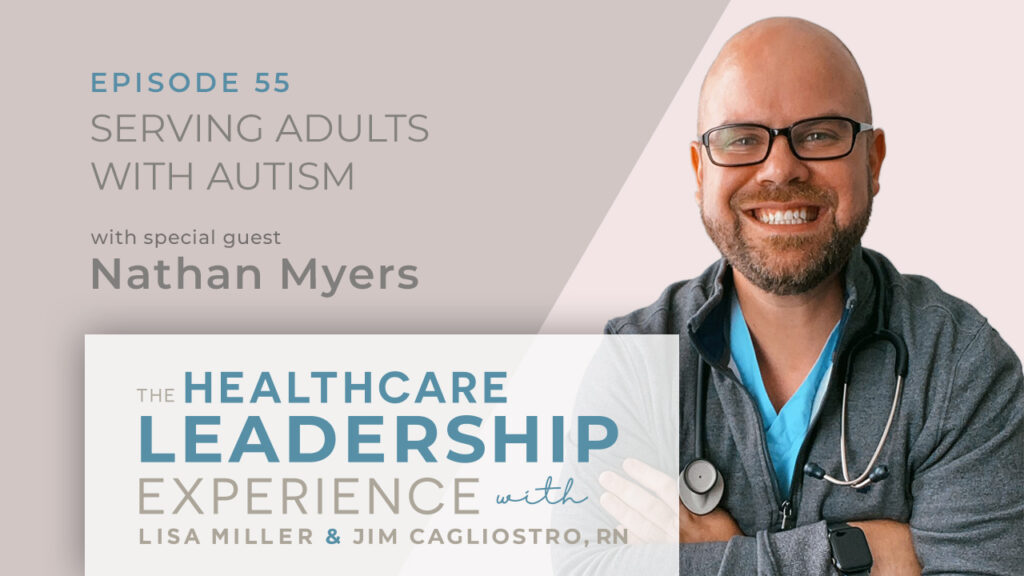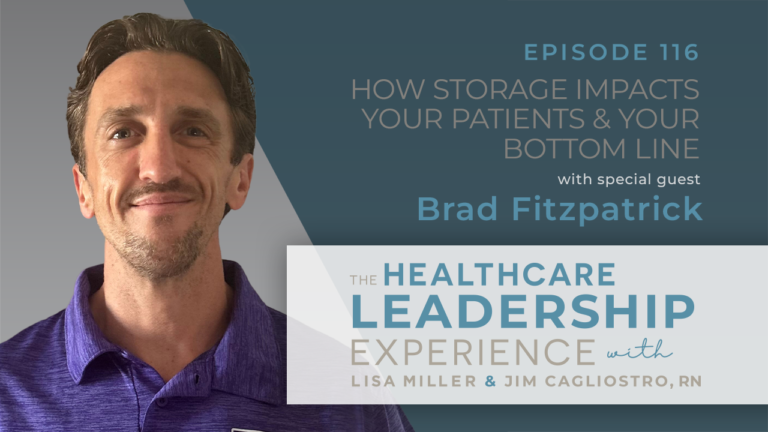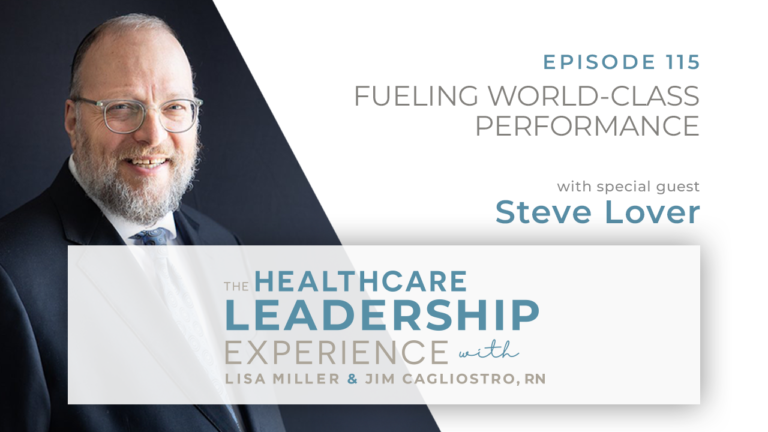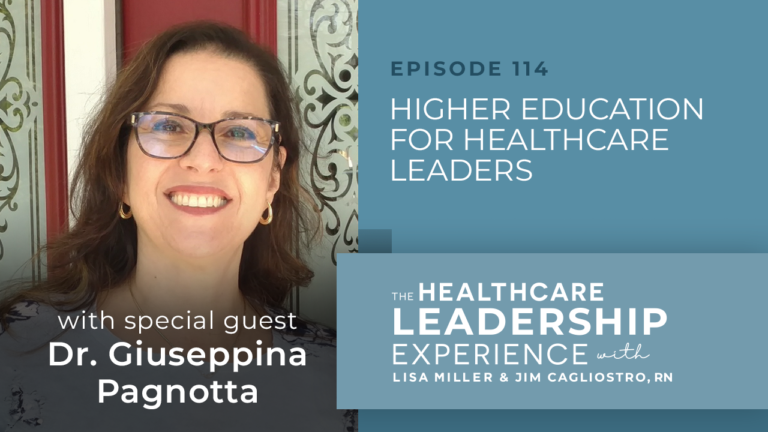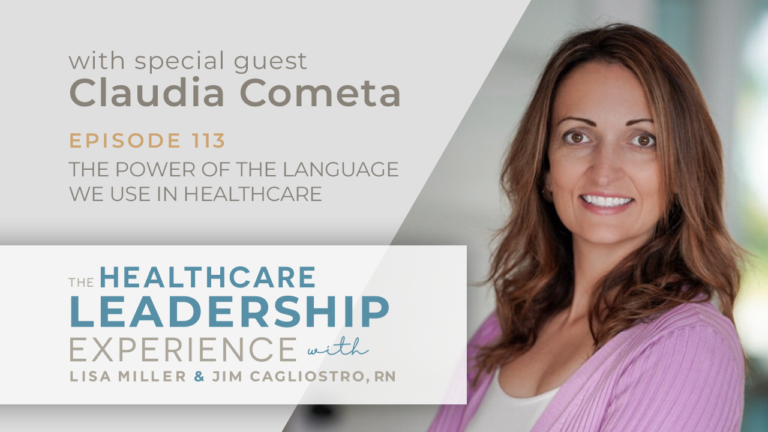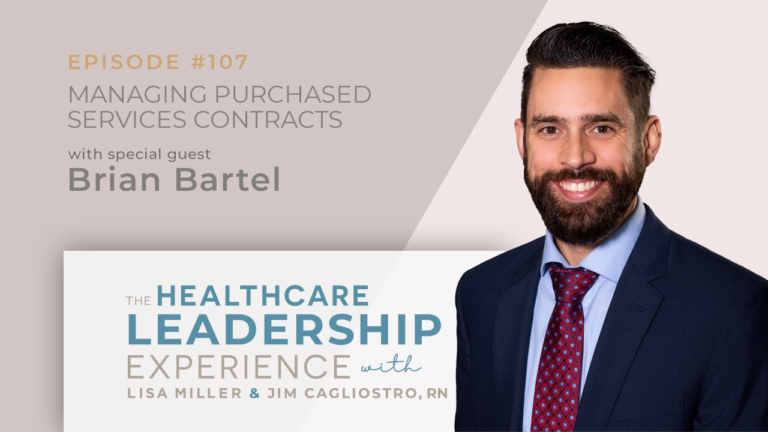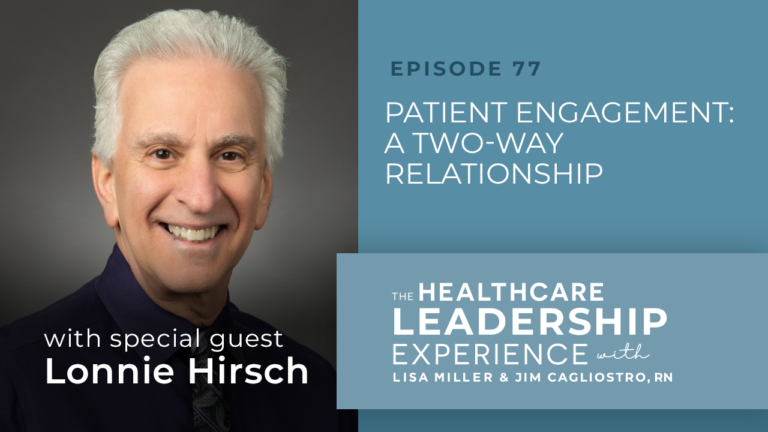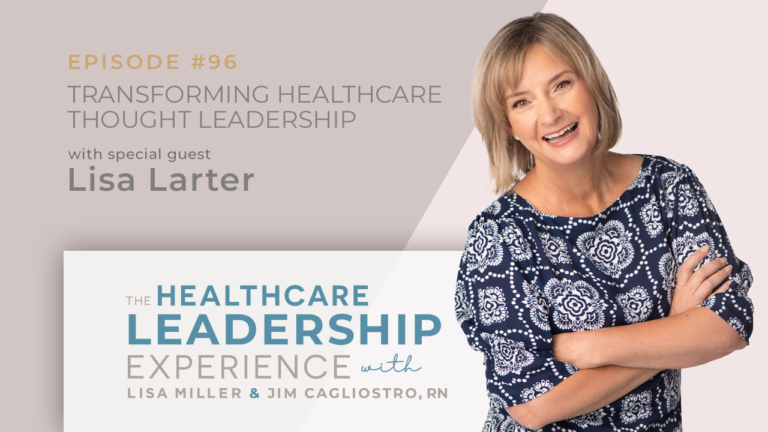In Episode 56 of The Healthcare Leadership Experience, Jim Cagliostro is joined by Nate Myers, Director of Health Services at Keystone Autism Services to discuss caring for people with intellectual disabilities.
Episode Introduction
In this episode, Jim Cagliostro, VIE Healthcare’s Clinical Operations Performance Improvement Expert, interviewed Nate Myers to discuss his experience serving adults with autism. Topics include the motivation behind Nate’s move to Keystone, the goal to provide health equity for people with autism, the growing demand for medical experts and advocates in the field, and the ‘’Platinum Rule’’ of Keystone Human Services.
Show Topics
- Working towards healing and wellness by focusing on strengths
- ‘’We grow the most when we’re stretched’’
- Providing community support to adults living with autism
- Leadership begins with having a passion for your work
- Achieving a certification in developmental disabilities nursing
- Striving for health equity for people with autism or disabilities
- The need for more experts and advocates in the medical field
- The ‘’Platinum Rule’’ of Keystone Human Services
Main Topics
03:08 Working towards healing and wellness by focusing on strengths
Nate said his decision to become a nurse was influenced by understanding that everyone deserves positive relationships and experiences.
Al explained that when a device fails, hospitals have a responsibility to return it to the manufacturer to obtain warranty credits.
‘’I’m pretty patient, I’m good at keeping a positive regard and encouraging others, so it just seemed to work. And I quickly developed an understanding and appreciation that every person desires and deserves everything good in life, to be understood, to be appreciated, to be independent as possible, do things that they enjoy, have positive relationships and be healthy. So that’s the same for people with intellectual disabilities or autism. Of course, they want those things just like everyone else does. And so I learned a lot about what it means to be a human, and deciding to become a nurse was kind of just an extension of what it means to care for someone who’s in a vulnerable position for sure but also working towards healing and wellness and focusing on strengths and not weaknesses. So all that kind of came together in my decision to be a nurse. And actually, when I told my wife, “I think I want to go to nursing school,” she was like, “Yes, that’s perfect. Go for it.” So she was always an encourager for me and rooted me through a lot of the difficult aspects of becoming a nurse.’’
07:49 ‘’We grow the most when we’re stretched’’
Nate said that asking lots of questions helped him to develop a keen understanding of the nursing basics.
‘’I think that’s really important when you’re in nursing is to challenge yourself. And I remember, going back to that encouragement from my wife, I remember when I started in the ICU, I felt so new and like I was in over my head. And my wife reminded me, we often grow the most when we’re stretched, when we feel stretched. And so I’ve remembered that. I’ve taught that to other people. And I just remember every time I face a challenge that I’m stretching and I’m growing at the same time. So I think that’s important to remember on anyone’s journey. But in all those settings, I developed kind of a keen understanding of all the basics of nursing: physical assessment, clinical skills, differential diagnoses, how to do patient education, just working with people. And I always ask questions of all the physicians. Probably people got tired of me asking tons of questions.’’
09:36: Providing community support to adults living with autism
Nate explained how his nursing background helps to provide medical care in the community for individuals with more complex needs.
‘’The majority of our participants actually live in home and community setting, meaning they’re living independently or with a roommate or with family, with their parents. We do also have some care dependent individuals. They receive 24/7 support just based on their support needs. And I was kind of pulled in, I think, primarily because some of those medically complex folks, they just needed a nurse to join the multidisciplinary team to assist all the staff and the leadership in what to do with those individuals. So yeah, so that’s a little about my experience. And I really feel like the role that I’m in now really blends some of those skills with just my personality and all my interests in a unique way. And I think at the very heart of nursing as a profession is a desire to optimize health and wellness for each patient. So I feel lucky because I get that opportunity to work as part of this multidisciplinary team, all these different disciplines. And in the community setting, I get to join the rest of the team to work on these person-centered strategies to overcome barriers and improve health and wellness. And it’s exciting because everyone’s different.’’
14:11 Leadership begins with having a passion for your work
Al gave an example of one high performing hospital at risk of a $1.5million to $2 million fine.
Nate said leaders must create culture and inspire excellence in everything they do.
‘’I think leadership has to start with having a passion for the work that you’re doing. It’s so important to have a sense of purpose or mission so that that is your compass. I feel like if you don’t have a compass to guide and direct your responses and your actions, it’s really difficult to educate, support and lead others if you don’t have that compass driving you. So leaders create culture, and I think it’s important to inspire excellence in everything that we do. I think leaders should be prepared as much as possible, pay close attention to the details while also remembering that bigger picture.’’
16:51 Gaining a certification in developmental disabilities nursing
Nate explained that gaining certification came out of a desire to support the team at Keystone Autism Services.
‘’Right. And the experience definitely weaves itself into leadership. You can lead others without a lot of experience for sure, but after being a nurse for over 10 years, you want to pass on what you’ve learned to others. And so getting that certification in developmental disabilities nursing really came out of a desire to be a leader in the field, but also to help really support the team at KAS as best as I can. So yeah, experience definitely, like I said, weaves itself into leadership kind of naturally….Because again, I had this kind of underlying passion for this population. So I’ve always kind of been interested in it, but again, you have to really be in a specific role serving the population for a certain amount of hours to achieve it. So it was kind of always unattainable before. Definitely not mandated, but if you’re interested in pursuing a specific population or a specific set of skills, I think if you’re driven and you have that level of interest and you want that experience, getting that certification is just kind of a solidification of that mindset, I think.’’
19:43 Striving for health equity for people with autism or disabilities
Nate outlined the services KAS offers to the local community.
‘’And so for KAS, services are catered to each individual so it’s very person-centered. It includes coordinating care for healthcare and therapy, various behavioral supports, family supports. We have a lot of emphasis on vocational and educational support for each individual and just enhancing wellness in general. And so the way I fit into that from a health perspective, we’re always striving for health equity in the population we support. So for the most part, all the recommended health related screenings for the general population based on age are going to be the exact same for individuals with autism or disabilities. So get all that as a baseline. So make sure that they’re getting those routine screenings: annual physical, dental exam, reviewing their medication appropriately. And then beyond that, when you talk about health equity, it’s identifying barriers that exist for individuals with disabilities and then enhancing supports to overcome those barriers. So we help identify specialists that address unique needs.’’
21:22 The need for more experts and advocates in the medical field
Nate observed that the prevalence of autism has increased, but individuals are not always getting the routine, preventative care they need.
‘’And so my goal when I’m teaching is to create a context in which we can meet the patient where they’re at and modify care appropriately to create positive outcomes. I mean, I feel like it’s really important for anyone that works in healthcare to know about. The prevalence of autism has only gone up in the last 20 years. We’ve seen it. CDC has a autism and developmental disabilities monitoring network, and in 2000 it was one in 150 8-year old children had an ASD diagnosis. Now the most recent is one in 44. So those kids are going to age out of the school system where there’s a lot more coordinated and kind of concrete support into adulthood where there’s a big gap and a big need for support. So that’s the population that we support, both vocationally and from a health and just life span perspective. So we need more experts and advocates in the medical field who have a deeper understanding for ASD, autism, and in general, intellectual and developmental disabilities. People are living longer lives and they often miss out on routine preventative care. Other issues like challenging behaviors can be treated with psychotropic medication or the accumulation of more meds than they need, but it could be just underlying illnesses that are missed, like GERD or gut sensitivities, things like that. And even in COVID, if your listeners are interested in learning more, the National Council on Disability put out a detailed report called The Impact of COVID-19 on the People with Disabilities.‘’
26:08 The Platinum Rule at Keystone Human Services
Nate said Keystone advocate for the Platinum Rule in the way they treat people.
‘’And then I’ll finish up by saying something that impacted me during my new employee orientation here at Keystone Human Services. I’m sure you’ve heard of the Golden Rule, treat others the way you want to be treated, but they advocate for what they call the Platinum Rule, which I thought was really cool. And it’s treat others the way they would want to be treated. So it really implies getting to know the person, listening to them, understanding the other person and their needs, and again, remembering every person wants to be understood, to feel comfortable and regulated, be as healthy as possible, and to be treated with dignity and respect. So let’s be kind to each other, right?’’
Show Links
📱Connect with Lisa Miller on LinkedIn
📱Connect with Jim Cagliostro on LinkedIn
📱Connect with Nathan Myers on LinkedIn
🖥 Check out VIE Healthcare and SpendMend
You’ll Also Hear:
- From Best Buddies at the Special Olympics to a summer job at Keystone Human Services at college; Nate’s early experience of working with people with disabilities, at a time when autism services didn’t exist.
- Changing your perspective, the life lessons learned from vulnerable people: ‘’What you can learn from them is much more than what you can do for them…. Realizing that everyone has vulnerabilities and needs… we’re all the same in that way.’’
- How a relationship-based approach to nursing care enables Nate to support people in the community over a longer period compared to an acute care setting.
- Coping with surprises: Why Nate’s experience hasn’t always been easy ‘’…but again, nothing worth doing is going to be easy….I’ll keep improving and that’s ultimately the goal.’’
- ‘’Filling in the gaps to create a richer sound.’’ How Nate’s musical background influences his leadership style in the nursing community.
- Discover the mission behind Keystone Autism Services: ‘’Identify and reduce barriers to all those good things in life that everyone wants … provide the support that people need to live their best life.’’
What To Do Next:
- Subscribe to The Cost Advantage for Healthcare Leaders and receive a special report on 15 Effective Cost Savings Strategies.
- Learn more about the simple 3 step process to work with us.
- If you are interested in learning more, the quickest way to get your questions answered is to speak with one of our margin improvement experts. Schedule a call with our team.
Episode Transcripts
CLICK HERE TO DOWNLOAD THE PDF TRANSCRIPT
CLICK HERE TO OPEN THE TRANSCRIPT
Introduction (00:49):
Welcome to The Healthcare Leadership Experience podcast hosted by Lisa Miller and Jim Cagliostro. Lisa is the founder of VIE Healthcare Consulting and now managing director at Spendmend.
Lisa and her team has generated over $1 billion in financial improvements for VIE’s clients since 1999. Since 2007 Jim has been a registered nurse working in critical care perioperative services and outpatient settings at nationally recognized medical facilities across three states. You’ll hear conversations on relevant and trending topics in healthcare and much more. Now here’s your hosts Lisa and Jim.
Jim Cagliostro (01:29)
Hi, this is Jim Cagliostro and you’re listening to The Healthcare Leadership Experience Radio Show. Today’s guest is Nathan Myers, Myers, Director of Health Services at Keystone Autism Services based in Central Pennsylvania. We’re excited to learn more about his leadership in that role and how it impacts the community that he serves. Welcome, Nate, and thanks for joining us today.
Nathan Myers, (01:50):
Thanks for having me, Jim.
Jim Cagliostro (01:53):
So Nate, communication leading up to this conversation, you explained to me basically that you got into nursing with a passion for serving and supporting individuals with disabilities. Can you tell our listeners why or how that became a passion for you and maybe how that has guided your journey up to this point?
Nathan Myers, (02:09):
Yeah, sure. Well, in college I had the opportunity to volunteer with Special Olympics and a program called Best Buddies, where students welcome adults with intellectual developmental disabilities onto campus and do a variety of activities together, just hang out, get to know each other. And I just really, really enjoyed it. I was kind of surprised how much I just really loved it. And I felt comfortable, the time passed by really quickly, and I just liked every second of it. That led to a summer job working direct support with Keystone Human Services, that’s kind of our umbrella company, where I supported three gentlemen with intellectual disabilities in a residential setting like their home. And in those experiences, the pleasure was really all mine. It was a good fit for me. I felt like my personality was aligned with a service and support role where I could apply some of my natural skills. I’m pretty patient, I’m good at keeping a positive regard and encouraging others, so it just seemed to work. And I quickly developed an understanding and appreciation that every person desires and deserves everything good in life, to be understood, to be appreciated, to be independent as possible, do things that they enjoy, have positive relationships and be healthy. So that’s the same for people with intellectual disabilities or autism. Of course, they want those things just like everyone else does. And so I learned a lot about what it means to be a human, and deciding to become a nurse was kind of just an extension of what it means to care for someone who’s in a vulnerable position for sure but also working towards healing and wellness and focusing on strengths and not weaknesses. So all that kind of came together in my decision to be a nurse. And actually, when I told my wife, “I think I want to go to nursing school,” she was like, “Yes, that’s perfect. Go for it.” So she was always an encourager for me and rooted me through a lot of the difficult aspects of becoming a nurse.
Jim Cagliostro (04:19):
It definitely helps to have that support. Well, first of all, I know I’ll forget to mention this. So you said you had worked with Keystone Services or the umbrella company. Was that the summer during your college years?
Nathan Myers, (04:32):
Yeah. So that was a cool connection.
Jim Cagliostro (04:34):
So 10 years later, or maybe not quite 10 years now you’re back with them?
Nathan Myers, (04:37):
Yeah, pretty much. Because it was like 2005. Well, more than 10 years, like 12 years later. And a lot of structurally things changed. I think probably Keystone Autism Services did not exist when I was doing direct support for Keystone Human Services. So it’s been kind of a neat journey to come full circle back to that.
Jim Cagliostro (04:58):
That’s great. And I will confirm what you said. I’ve known you for a while, and your personality just does fit in terms of serving people that have those specific needs, and you have that right mindset, that right character for it. And as you’re talking there, you’re just making me think about those experiences really shaped your perspective. I mean, I don’t know, would you say they drastically changed your perspective, or just kind of gave you a better understanding of this population?
Nathan Myers, (05:26):
Yeah, I think everyone would benefit from spending time with a variety of individuals in general. I mean, we know that, but specifically people that have disabilities and what you can learn from them is much more than what you can do for them. And we’re just all, again, we’re all wanting the same things.We want to be understood, we all need help in different ways. And so just kind of realizing that everyone has vulnerabilities and needs, so we’re all the same in that way.
Jim Cagliostro (05:56):
I love that. I’m writing that down right now. What you can learn from them is greater than what you can do for them, and I think that’s great. I mean, again, in many aspects of life, like you said. That’s awesome. So I do want to talk a little bit maybe about your nursing experience or other experiences. Would you mind sharing a little more detail about your journey, your education, maybe the jobs that you’ve held in nursing and even outside of nursing that you feel has shaped you and prepared you for the current role that you’re in?
Nathan Myers, (06:23):
Yes, definitely. Well, I think, and you know this, the most exciting thing about nursing is the variety of experiences and the limitless opportunities that exist if you’re willing to work hard and you’re willing to learn new things. So I decided to go to nursing school, graduate in 2011. So that was my second bachelor’s but I was honing in on what I wanted to do there. So then that was-
Jim Cagliostro (06:48):
Sorry to cut you off. What was your first bachelor’s in? I forgot.
Nathan Myers, (06:51):
Human resource management.
Jim Cagliostro (06:53):
Okay. Thank you.
Nathan Myers, (06:54):
So I use that in some ways in leadership and understanding the HR side of personnel. But yeah, I definitely didn’t pursue that route in the end and nursing is a much better fit for me. But you don’t know when you’re first deciding what your career is going to be for the rest of your life. So I graduated in 2011 from UNC. I worked in North Carolina for several years, and then we moved back up to Pennsylvania in 2017. But I’ve worked in the PACU, pre-op settings. I helped with regional nerve blocks and worked with anesthesia through that. Then I jumped to medical ICU at University of North Carolina hospitals. I’ve worked in kind of a general ICU, rapid response charge nurse. So kind of the whole gamut of experience, and floated to different floors. So with all those experiences, I always tried my best to challenge myself, learn something new, try to take on new roles. I think that’s really important when you’re in nursing is to challenge yourself. And I remember, going back to that encouragement from my wife, I remember when I started in the ICU, I felt so new and like I was in over my head. And my wife reminded me, we often grow the most when we’re stretched, when we feel stretched. And so I’ve remembered that. I’ve taught that to other people. And I just remember every time I face a challenge that I’m stretching and I’m growing at the same time. So, I think that’s important to remember on anyone’s journey. But in all those settings, I developed kind of a keen understanding of all the basics of nursing: physical assessment, clinical skills, differential diagnoses, how to do patient education, just working with people. And I always ask questions of all the physicians. Probably people got tired of me asking tons of questions. So talk to respiratory therapy all the time, PT, OT, whoever I could have a conversation with, I’d pick their brain and see what they thought about things. So super interesting and I just loved my experience in the ICU and learned so much there. But I continued to wonder how I could blend my occupation as a registered nurse and be able to support individuals with disabilities, so that was always kind of in the back of my head. I did end up working as a nurse consultant with The ARC of North Carolina. I helped them develop a medication administration program and did some nursing, consulting for more medically complex individuals. So I kept my foot in the door in that setting. But then in 2018, I was lucky enough to join Keystone Autism Services. Our agency supports adults over the age of 21 with a diagnosis of autism spectrum disorder. And the majority of our participants actually live in home and community setting, meaning they’re living independently or with a roommate or with family, with their parents. We do also have some care dependent individuals. They receive 24/7 support just based on their support needs. And I was kind of pulled in, I think, primarily because some of those medically complex folks, they just needed a nurse to join the multidisciplinary team to assist all the staff and the leadership in what to do with those individuals. So yeah, so that’s a little about my experience. And I really feel like the role that I’m in now really blends some of those skills with just my personality and all my interests in a unique way. And I think at the very heart of nursing as a profession is a desire to optimize health and wellness for each patient. So I feel lucky because I get that opportunity to work as part of this multidisciplinary team, all these different disciplines. And in the community setting, I get to join the rest of the team to work on these person-centered strategies to overcome barriers and improve health and wellness. And it’s exciting because everyone’s different. I use really kind of a relationship-based approach to nursing care, and so I’m able to support them over a longer period of time than I would in an acute care setting. So very interesting work.
Jim Cagliostro (10:57):
You don’t have to elaborate on this, but you can simply answer, is this whole journey, is it harder than you thought it would be? Is it what you expected? Were there a lot of surprises along the way?
Nathan Myers, (11:06):
Yeah, I mean, definitely a lot of surprises. Definitely harder in some points than I thought it would be. But again, nothing worth doing is going to be easy. If you have that goal in mind and you have a vision to continually improve yourself as a professional with that positive attitude and just that approach where, hey, I’m going to do my best. I know I’m not going to be the best at any given time, but I’ll just keep improving and that’s ultimately the goal.
Jim Cagliostro (11:33):
That’s great. I love that you keep bringing that out with that, just you said, we often grow the most when we are stretched. You’ve probably heard the saying, I may have shared it on this podcast before, but smooth seas never made strong sailors, right?
Nathan Myers, (11:43):
Yeah, I’ve heard that one.
Jim Cagliostro (11:44):
That’s when we grow the most, that’s when we’re strengthened. And sometimes it involves failure. And I love what you’re talking about, the multidisciplinary team in terms of, as a nurse, I’m big on this, we have to be part of whatever that team is because we don’t have the expertise on everything. We might have expertise in many things, physically, emotionally, but you talked about working with physical therapy, respiratory therapy, all these different experts within the hospital setting. But then that also carries over to the role that you have now, which we’re going to get into. If you’re just tuning in, you are listening to the Healthcare Leadership Experience Radio show, and I’m your host, Jim Cagliostro. This show is sponsored by VIE Healthcare Consulting, a SpendMend company, which provides leading edge financial and operational consulting for hospitals, healthcare institutions, and other providers of patient care. Since 1999, VIE has been a recognized leader in healthcare costs, hospital purchase services, healthcare benchmarking, supply chain management, and performance improvement. You can learn more about VIE Healthcare Consulting at viehealthcare.com. Okay, Nate, so in talking more, I guess shift gears more to this idea of leadership. What have you learned specifically about leadership in your current role? And if you want to describe your role a little bit more, you’re welcome to do that too, but what have you learned about leadership in particular as the director of health services at Keystone Autism Services?
Nathan Myers, (13:10):
Sure. Yeah. And just a little bit more about my role. So I’m a certified developmental disabilities nurse, I got certified this year. And so you have to kind of be in this niche in this field serving a certain population to sit for that exam and then pass that. So I definitely use that knowledge every day. And again, I’m working as part of the rest of this team so it’s really a collaborative approach. I’m often supporting our most medically complex individuals who are care dependent, and that includes educating and supporting our direct support staff. And by the way, everyone should know about direct support professionals. Look up what they do for a living, and you’ll quickly be amazed the amount of different things they do, their patience, their positive attitudes and the skills they have. Sometimes I feel like they’re right up there with the ability to be a nurse with all the different tasks that they do. But they work direct support in all aspects of life, support our individuals to optimizing their behavioral health and their physical health as much as possible. So I work with them a lot and their supervisors. I oversee our medication administration training, lots of health competency training and A2 training. And then, again, meeting with the teams in home and community to figure out how we can overcome barriers and optimize health for those folks that live independently or with their family members. So that’s a little bit about that. I think leadership has to start with having a passion for the work that you’re doing. It’s so important to have a sense of purpose or mission so that that is your compass. I feel like if you don’t have a compass to guide and direct your responses and your actions, it’s really difficult to educate, support and lead others if you don’t have that compass driving you. So leaders create culture, and I think it’s important to inspire excellence in everything that we do. I think leaders should be prepared as much as possible, pay close attention to the details while also remembering that bigger picture.
Jim Cagliostro (15:08):
And just what you said about passion and having a mission. People notice. The people that work for you or with you, they’ll recognize if you’re passionate about what you’re doing. And especially when it comes to healthcare, you mentioned about some of the things that direct support professionals do. It’s difficult work, it’s challenging work. And if you don’t have that passion, people will catch on pretty quickly. And then it’s hard to follow someone that doesn’t have a heart for what they’re doing. So I know we talked about this a little bit. In terms of your leadership style, if I can ask you a little bit about that, how would you describe yourself as a leader? Is it something that you’re very comfortable with? Is it something that you’ve had to grow into? How would you break that down for us?
Nathan Myers, (15:48):
Yeah, I’ve always felt comfortable in a supportive role. We’ve talked about this before, Jim, but even in my hobbies, I like to play music, I’m a musician, and I find great joy in essentially backing someone else up musically and filling in the gaps to create a richer sound. So even in my hobbies, I feel very settled and comfortable in that supportive role. So in nursing, in my current position, if I am leading, I’m leading kind of by supporting and I really value making sure everyone’s heard and understood. And I think that just naturally lends itself to leadership. But yeah, I don’t see myself as a great leader, but I think it happens kind of organically.
Jim Cagliostro (16:28):
Yeah. And I love that you said lead by supporting. I think you said something along the lines of filling in the gaps. I definitely fall in that category more, but there’s this idea of servant leadership that says, hey, you’re willing to get in, get your hands dirty and just do what needs to be done in order to get the job done and to do it well. And I think that’s a great aspect of leadership that sometimes we forget. It’s not just about standing in front and telling people what to do.
Nathan Myers, (16:51):
Right. And the experience definitely weaves itself into leadership. You can lead others without a lot of experience for sure, but after being a nurse for over 10 years, you want to pass on what you’ve learned to others. And so getting that certification in developmental disabilities nursing really came out of a desire to be a leader in the field, but also to help really support the team at KAS as best as I can. So yeah, experience definitely, like I said, weaves itself into leadership kind of naturally.
Jim Cagliostro (17:23):
Sure. That certification, was that something that someone encouraged you? Is that kind of the expectation in the role that you have? Or is that something you said, hey, this is just going to help me in terms of what I want to be able to do?
Nathan Myers, (17:35):
Yeah, I mean, I looked into it when I was in nursing school. Because again, I had this kind of underlying passion for this population. So I’ve always kind of been interested in it, but again, you have to really be in a specific role serving the population for a certain amount of hours to achieve it. So it was kind of always unattainable before. Definitely not mandated, but if you’re interested in pursuing a specific population or a specific set of skills, I think if you’re driven and you have that level of interest and you want that experience, getting that certification is just kind of a solidification of that mindset, I think.
Jim Cagliostro (18:12):
That’s great. That’s great. And I do love what you said, I’m going back to what you said about experience and the importance of experience. Many times we go in, especially in healthcare, but in any industry, you go into something, there has to be a first time that you’re doing something, especially if it’s something innovative or if there’s a new problem, you’re trying to find new ways to solve it. And there’s going to be a first time, and my boss has talked to me about this. It’s so important to just be willing to, like you said earlier, learn new things and eventually you will become experienced, you’ll become an expert in that arena by the simple fact of repetition. And I think that’s a valuable thing that you bring to leadership and over time that only gets better.
Nathan Myers, (18:50):
Yep.
Jim Cagliostro (18:51):
So in terms of impact, can you share a little bit about the impact of your organization on the community and the families that you serve? Maybe a big picture of the impact that you’re having in Central PA, and more specific, maybe families that you’ve worked with, and then how you personally fit into that big picture.
Nathan Myers, (19:10):
Right. Yeah. I could talk a long time about all the great things that Keystone Human Services does. I mean, they’re an international organization, nonprofit, serve a variety of different people in different states. For Keystone Autism Services and Keystone Human Services I think the mission’s pretty clear: identify and reduce barriers to all those good things in life that I mentioned before that everyone wants, and offer and provide the supports that people need to live their best life. So that’s kind of the general mission, I think. I don’t want to speak for everyone, but that’s kind of the idea that I get. And so for KAS, services are catered to each individual so it’s very person-centered. It includes coordinating care for healthcare and therapy, various behavioral supports, family supports. We have a lot of emphasis on vocational and educational support for each individual and just enhancing wellness in general. And so the way I fit into that from a health perspective, we’re always striving for health equity in the population we support. So for the most part, all the recommended health related screenings for the general population based on age are going to be the exact same for individuals with autism or disabilities. So get all that as a baseline. So make sure that they’re getting those routine screenings: annual physical, dental exam, reviewing their medication appropriately. And then beyond that, when you talk about health equity, it’s identifying barriers that exist for individuals with disabilities and then enhancing supports to overcome those barriers. So we help identify specialists that address unique needs. We work with each individual to navigate the healthcare system as independently as possible and be self-advocates, and then help them make accommodations as necessary. And one thing I’m really excited about is educating other healthcare professionals, nurses, doctors, other groups to provide better care for individuals with disabilities, specifically autism for my population. But I teach about how to adapt communication style, understand how autism can impact patient interaction, understanding sensory processing differences, things like that. And so my goal when I’m teaching is to create a context in which we can meet the patient where they’re at and modify care appropriately to create positive outcomes. I mean, I feel like it’s really important for anyone that works in healthcare to know about. The prevalence of autism has only gone up in the last 20 years. We’ve seen it. CDC has a autism and developmental disabilities monitoring network, and in 2000 it was one in 150 8-year old children had an ASD diagnosis. Now the most recent is one in 44. So those kids are going to age out of the school system where there’s a lot more coordinated and kind of concrete support into adulthood where there’s a big gap and a big need for support. So that’s the population that we support, both vocationally and from a health and just life span perspective. So we need more experts and advocates in the medical field who have a deeper understanding for ASD, autism, and in general, intellectual and developmental disabilities. People are living longer lives and they often miss out on routine preventative care. Other issues like challenging behaviors can be treated with psychotropic medication or the accumulation of more meds than they need, but it could be just underlying illnesses that are missed, like GERD or gut sensitivities, things like that. And even in COVID, if your listeners are interested in learning more, the National Council on Disability put out a detailed report called The Impact of COVID-19 on the People with Disabilities. And there’s a lot of disparities and a lot of ways in which care was denied for this population. That really had a big impact on the way I kind of saw the system. And actually, that report said that having an intellectual or developmental disability has been the highest independent risk factor for contracting COVID, and that population is six times more likely to die from COVID than the rest of the population. There’s pretty big, interesting statistics to consider.
Jim Cagliostro (23:33):
And Nate, man, we don’t have time but you hit on a lot of stuff that I’m passionate about. I mean, you mentioned person-centered care, and I talk a lot about patient-centered care, family-centered care. We could be doing an excellent job in whatever healthcare setting. And we got a great program, we’re really taking care of most of our patients. But if we’re missing a significant portion of our patient population, especially like you mentioned with those with autism, it’s a growing portion of our population, then we’re falling short. There’s always more we can be doing. It’s patient-centered care for the patients whose needs you’re meeting, but there is this specific population that have specific needs like coordinating care, and that’s a huge thing, I think. My mind often goes to the hospital setting, but what happens after when you send these patients home or when they do need an adjustment in medication or there’s an underlying, maybe we’d call it a minor reflux or gut sensitivity, things like that? But if that’s not addressed, then it’s not truly patient-centered care. We’re missing something that this population might need. I love you hit on so much there. And then the impact on COVID for those with disabilities. I did hear about that, I didn’t look into it, but that makes sense. I mean, that’s something that is a reality that the healthcare industry can address. And you’re doing it obviously with Keystone Autism Services. I guess to close our time, Nate, is there any recommendations that you would like to leave with our listeners? Anything that you’d say personally you’ve learned about leadership, anything you’ve learned about people, maybe specifically working with people with autism? Any last words you’d like to leave us with, Nate?
Nathan Myers, (25:11):
Yeah, I guess just reiterating some of our points of discussion so far. I think the best leaders are listeners and supporters. We talked about that. The nurse managers and mentors that I looked up to the most didn’t tell me what to do from a distance, but joined me at the bedside, supported me and kind of showed me and helped me to learn by showing and supporting and listening to what I was asking. So I think that’s a really important thing to remember. I think good leaders know it’s all about collaboration and teamwork. No one can do it alone. We mentioned that. We mentioned this, but I always made my best effort to approach maybe housekeeping the same way that I would the team of physicians doing rounding. I feel like from the bottom up, we all matter and we’re all doing our best. And so collaborating together towards this common goal of patient care or care for whatever population you’re working with is important.And then I’ll finish up by saying something that impacted me during my new employee orientation here at Keystone Human Services. I’m sure you’ve heard of the Golden Rule, treat others the way you want to be treated, but they advocate for what they call the Platinum Rule, which I thought was really cool. And it’s treat others the way they would want to be treated. So it really implies getting to know the person, listening to them, understanding the other person and their needs, and again, remembering every person wants to be understood, to feel comfortable and regulated, be as healthy as possible, and to be treated with dignity and respect. So let’s be kind to each other, right?
Jim Cagliostro (26:47):
That’s awesome. I love that. The Platinum Rule, I’m going to remember that. Thank you so much, Nate. Thank you for being on the show today. And thank you to our listeners who spent time with us today. If you have any questions about VIE Healthcare Consulting, a SpendMend company, or if you want to reach out to me or Lisa Miller, you can find us on LinkedIn. I know you can find Nate on LinkedIn as well. We at VIE love helping hospitals save money and enhance the patient experience, and we’re hoping that the episode today gave you some new insights or ideas to consider and use in your career and in your own healthcare organization. So Nate, thank you once again. Really enjoyed the conversation. Thank you for being with us today.
Nathan Myers, (27:25):
Thanks, Jim.
Outro (27:27):
Thanks for listening to The Healthcare Leadership Experience Podcast, we hope you’ve enjoyed this episode. If you’re interested in learning new strategies, best practices and ideas to utilize your career and health care organization check out our website at thehealthcareleadershipexperience.com and oh yeah don’t forget to rate and review us and be sure to join Lisa and Jim next time on the Healthcare Leadership Experience Podcast.
Thanks again for listening!
